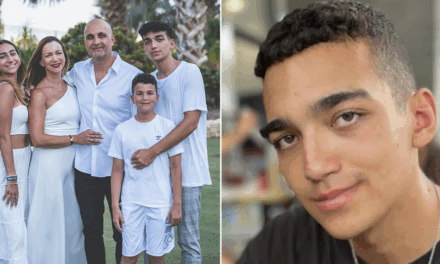A Navy veteran, known for his resilience and determination, is reigniting his battle to clear his name by filing a new lawsuit against U.S. News & World Report following his recent victory against CNN in court. This ongoing legal saga highlights the struggles of individuals in the face of perceived public misrepresentation and the complexities involved in navigating the judicial system.
In the initial case against CNN, the veteran successfully argued that the news network’s portrayal of him was not only misleading but also damaging to his reputation. His courageous fight in the courtroom set a significant precedent in defamation cases, especially as they relate to veterans and their public images. The outcome of this trial served as a beacon of hope for many who feel wronged by media entities yet lack the resources to pursue similar legal actions.
The veteran’s legal battle began when he was featured in a CNN report that contained allegations about his conduct while serving in the military. These claims were found to be unfounded, and the court ruled in his favor, resulting in a settlement that not only aided him financially but also restored his dignity. This victory was a pivotal moment, affirming the importance of responsible journalism and the accountability of media organizations for their reporting standards.
Now, the veteran is determined to address another chapter of his ordeal. With a fresh lawsuit against U.S. News & World Report, he seeks to shed light on additional misrepresentations and to hold the publication accountable for what he believes to be similarly negligent reporting. Despite the challenges that come with taking on major media outlets, he remains undeterred, fueled by the desire to defend both his character and the integrity of those who have served in the military.
The latest lawsuit is rooted in a series of articles published by U.S. News & World Report that the veteran alleges contain false information about his military service and personal life. In the court filings, his legal team argues that the articles perpetuated harmful stereotypes about veterans and, specifically, about the challenges they face when transitioning back into civilian life. The veteran contends that these inaccuracies have resulted in personal and professional setbacks, reinforcing the stigma associated with veterans in today’s society.
In recent interviews, the veteran expressed his frustration with how media narratives can impact public perception. He noted that while journalism is a pillar of democracy, it also comes with significant responsibilities. “People need to understand that words have power, and when they are used carelessly, they can destroy lives,” he stated. His fight is not merely about seeking reparation for himself but also about advocating for justice for all veterans who may find themselves in similar predicaments due to misreporting.
The legal landscape for defamation cases involving public figures is notoriously complex. In the United States, the law provides a high threshold for proving defamation, especially for individuals defined as public figures. This includes showing that the media entity acted with “actual malice,” meaning they knew the information was false or acted with reckless disregard for the truth. Given that the veteran is considered a public figure in this context, his legal team faces a formidable challenge in navigating these legal waters.
The veteran’s case against U.S. News & World Report underscores a broader conversation about the relationship between the media and the public, particularly regarding veterans. According to various studies, veterans often face significant mental health challenges, including PTSD, anxiety, and depression, influenced by the stigma surrounding their experiences. Misrepresentations in the media can exacerbate these issues, further alienating veterans from the support they need. By challenging U.S. News & World Report, the veteran aims to raise awareness about this critical issue, encouraging more responsible and empathetic reporting practices.
A plethora of veteran advocacy groups have rallied behind him, recognizing the importance of this case not only for the veteran community but also as an emblem of accountability for media organizations. They argue that accurate representation is pivotal in dismantling harmful stereotypes and fostering a more accurate understanding of veterans’ contributions and challenges in society.
As public interest grows around this lawsuit, many are watching closely to see how it unfolds. Legal analysts suggest that the outcome could have significant implications for how media outlets approach reporting on sensitive subjects, particularly regarding the lives and experiences of veterans. It could potentially set a new standard for accountability, encouraging more thorough fact-checking and nuanced storytelling in the future.
Beyond the courtroom, this veteran’s story resonates with many on a personal level. His ordeal highlights the struggles that individuals often face when narratives diverge from reality, leading to long-lasting effects that are not easily repaired. The emotional toll of such experiences can be profound, prompting many to feel isolated or misunderstood by their own communities.
In his quest for vindication, the Navy veteran also emphasizes the significance of mental health resources and support systems for veterans. He believes that addressing the challenges posed by misinformation is intricately linked to advocating for better access to mental health services. This holistic approach not only empowers those affected by misrepresentation but also fosters an environment where veterans can more comfortably seek help and support without fear of judgment or misunderstanding.
The veteran’s ongoing journey is particularly poignant in a media landscape increasingly driven by sensationalism and instant narratives. This situation compels readers to engage with the content critically, urging a demand for journalistic integrity that emphasizes truth over sensational headlines. The need for compassionate storytelling is more relevant than ever, especially concerning communities such as veterans who have already faced significant challenges and sacrifice.
As he moves forward with his legal battle against U.S. News & World Report, the Navy veteran remains committed to his cause. He is prepared to face whatever hurdles may arise and is optimistic that justice will prevail. He hopes his efforts will contribute to necessary changes in media practices and inspire others to advocate for themselves when faced with similar situations.
Ultimately, this case is not merely about one veteran fighting for his reputation; it symbolizes a larger struggle — the fight for dignity, truth, and respect for all who have served. As the trial date approaches, the veteran invites others to join him in raising awareness about the critical importance of accurate and fair representation in media, especially concerning those who have dedicated their lives to serving their country. It is a rallying cry for accountability in journalism and a vital reminder of the profound impact that words, when wielded irresponsibly, can have on real lives.
































